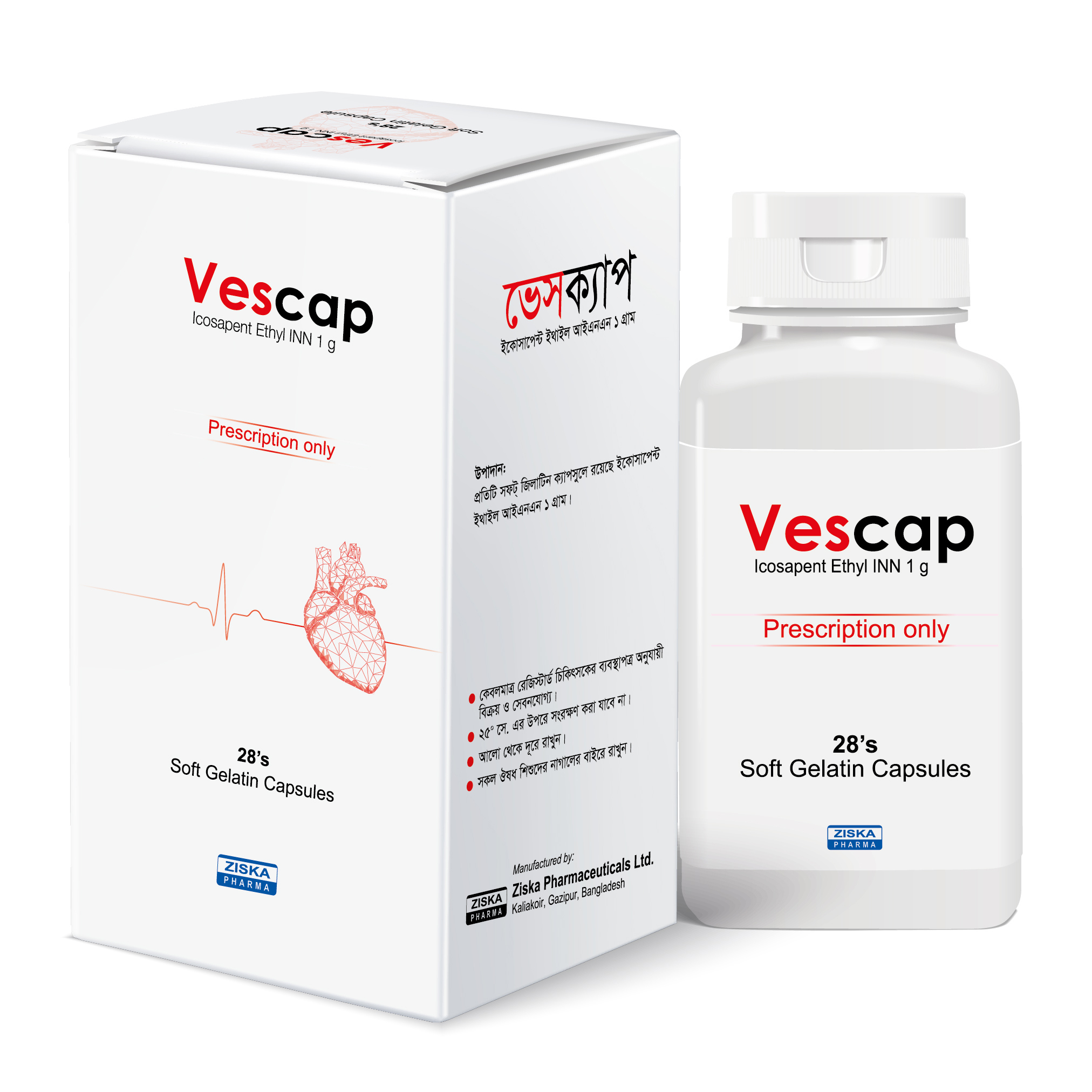Unit Price:
৳ 50.00
(1 x 28: ৳ 1,400.00)
Strip Price:
৳ 1,400.00
Indications
Vescap capsule is indicated as an adjunct to maximally tolerated statin therapy to reduce the risk of myocardial infarction, stroke, coronary revascularization, and unstable angina requiring hospitalization in adult patients with-
Limitations of use: The effect of Vescap on the risk for pancreatitis in patients with severe hypertriglyceridemia has not been determined.
- Elevated triglyceride (TG) levels (> 150 mg/dL) and
- Established cardiovascular disease or Diabetes mellitus and 2 or
- More additional risk factors for cardiovascular disease.
Limitations of use: The effect of Vescap on the risk for pancreatitis in patients with severe hypertriglyceridemia has not been determined.
* রেজিস্টার্ড চিকিৎসকের পরামর্শ মোতাবেক ঔষধ সেবন করুন
Pharmacology
Icosapent Ethyl is an ethyl ester of the omega-3 fatty acid eicosapentaenoic acid (EPA). EPA reduces hepatic very low-density lipoprotein triglycerides (VLDL-TG) synthesis and/or secretion and enhances TG clearance from circulating VLDL particles. Potential mechanisms of action include increased p-oxidation; inhibition of acyl-CoA:1,2-diacylglycerol acyltransferase (DGAT); decreased lipogenesis in the liver; and increased plasma lipoprotein lipase activity.
Dosage & Administration
The daily dose of Vescap is 4 grams per day taken as Two 1 gm capsules twice daily with food. Advise patients to swallow capsules whole. Do not break open, crush, dissolve, or chew Vescap.
Renal Impairment: Icosapent ethyl has not been studied in patients with renal impairment.
Hepatic Impairment: In patients with hepatic impairment, alanine aminotransferase (ALT) and aspartate aminotransferase (AST) levels should be monitored periodically during therapy with Icosapent ethyl.
Pediatric use: Safety and effectiveness in pediatric patients have not been established.
Geriatric use: Icosapent ethyl is safe and effective in geriatric patients.
Renal Impairment: Icosapent ethyl has not been studied in patients with renal impairment.
Hepatic Impairment: In patients with hepatic impairment, alanine aminotransferase (ALT) and aspartate aminotransferase (AST) levels should be monitored periodically during therapy with Icosapent ethyl.
Pediatric use: Safety and effectiveness in pediatric patients have not been established.
Geriatric use: Icosapent ethyl is safe and effective in geriatric patients.
* রেজিস্টার্ড চিকিৎসকের পরামর্শ মোতাবেক ঔষধ সেবন করুন
Interaction
Increased Bleeding Risk with Anticoagulants and Antiplatelet Agents: Some published studies with omega-3 fatty acids have demonstrated prolongation of bleeding time. Monitor patients receiving Vescap and concomitant anticoagulants and/or antiplatelet agents for bleeding.
Contraindications
This is contraindicated in patients with known hypersensitivity (e.g., anaphylactic reaction) to Icosapent Ethyl or any of its components.
Side Effects
Common adverse reactions in the cardiovascular outcomes trial: Musculoskeletal pain, peripheral edema, constipation, gout, and atrial fibrillation. Common adverse reactions in the hypertriglyceridemia trials: arthralgia and oropharyngeal pain.
Pregnancy & Lactation
Use during pregnancy only if the potential benefit justifies the potential risk to the fetus. Studies have detected omega-3 fatty acids, including EPA, in human milk. Because of the potential adverse effects on the nursing infant, decide whether to discontinue nursing or discontinue the drug, taking into account the importance of the drug to the mother.
Precautions & Warnings
Atrial fibrillation/flutter: Vescap was associated with an increased risk of atrial fibrillation or atrial flutter requiring hospitalization in a double-blind, placebo-controlled trial. The incidence of atrial fibrillation was greater in patients with a previous history of atrial fibrillation or atrial flutter.
Potential for allergic reactions in patients with fish allergy: Vescap contains ethyl esters of the omega-3 fatty acid, eicosapentaenoic acid (EPA), obtained from the oil of fish. It is not known whether patients with allergies to fish and/or shellfish are at increased risk of an allergic reaction to Vescap. If patients have known hypersensitivity to fish and/or shellfish about the potential for allergic reactions then they should discontinue Vescap and seek medical attention.
Bleeding: Vescap was associated with an increased risk of bleeding in a double-blind, placebo-controlled trial. The incidence of bleeding was greater in patients receiving concomitant antithrombotic medications, such as aspirin, clopidogrel, or warfarin.
Potential for allergic reactions in patients with fish allergy: Vescap contains ethyl esters of the omega-3 fatty acid, eicosapentaenoic acid (EPA), obtained from the oil of fish. It is not known whether patients with allergies to fish and/or shellfish are at increased risk of an allergic reaction to Vescap. If patients have known hypersensitivity to fish and/or shellfish about the potential for allergic reactions then they should discontinue Vescap and seek medical attention.
Bleeding: Vescap was associated with an increased risk of bleeding in a double-blind, placebo-controlled trial. The incidence of bleeding was greater in patients receiving concomitant antithrombotic medications, such as aspirin, clopidogrel, or warfarin.
Therapeutic Class
Other Anti-anginal & Anti-ischaemic drugs
Storage Conditions
Do not store above 25°C. Protect from light. Keep out of the reach of children.

